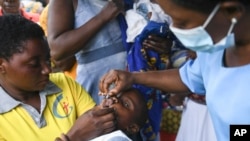Amid a global "backslide" in childhood immunization over those three years, which UNICEF said is the worst regression for childhood vaccinations in 30 years, Africa is the region with the highest number of unvaccinated and under-vaccinated children.
UNICEF said that 12.7 million African children missed one or more vaccinations and 8.7 million didn't receive a single dose of any vaccine from 2019-2021.
The report, “The State of the World's Children 2023,” confirms previous indications and lays out more data showing that the pandemic “interrupted childhood vaccination almost everywhere,” UNICEF said.
Half of the 20 countries in the world with the largest number of children without any vaccinations — referred to as “zero-dose” children — are in Africa, UNICEF said. In Nigeria, 2.2 million children have never received a vaccination. In Ethiopia, 1.1 million are unvaccinated against diseases.
UNICEF's report comes as Africa, but also other parts of the world, report disease outbreaks on a scale not seen in years. In the southern African nation of Malawi, more than 1,000 people died in a cholera outbreak at the start of the year, the worst there in 20 years. Nearly 700 children died in a measles outbreak in Zimbabwe last year. Most of the Zimbabwean children were unvaccinated against the disease, authorities said.
UNICEF said the “intense demands on health systems, the diversions of immunization resources to COVID-19 vaccination, health worker shortages and stay-at-home measures” all contributed to missed vaccinations across the world. So did conflicts, climate change and vaccine hesitancy.
But in Africa, the pandemic exposed and exacerbated the “lack of resilience and persistent weaknesses in health systems and primary health care,” UNICEF said.
Last year, 34 of the 54 countries in Africa experienced disease outbreaks such as measles, cholera and poliovirus, UNICEF said, adding there's a "child survival crisis" on the continent.
The resurgence of those diseases should serve as a clear warning for Africa, said Mohamed M. Fall, UNICEF Regional Director for Eastern and Southern Africa.
“African leaders must act now and take strong political action to reduce the gap in vaccination and make sure that all children are immunized and protected,” he said.
UNICEF noted that children born just before or during the pandemic were now moving past the age when they would normally be vaccinated and stressed the need for health authorities to “catch up" with those missed vaccinations to prevent more deadly disease outbreaks.
Also Thursday, the World Health Organization released its assessment, saying Africa needs to vaccinate an estimated 33 million children by 2025 to get “back on track” and recover from the COVID-19 pandemic’s “disruptive wake.”
